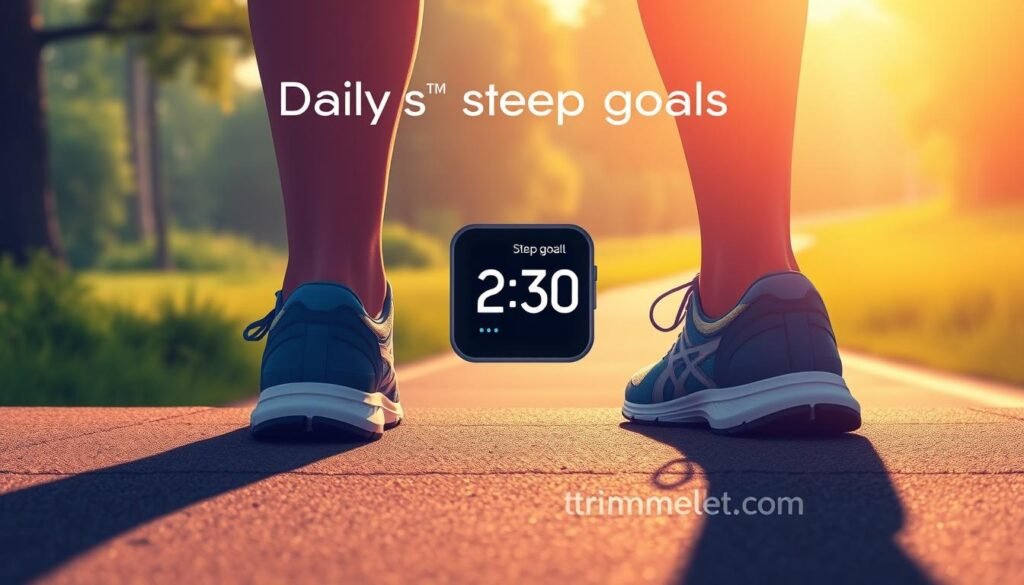8,000 Daily Steps: See Your Health Transform!
Ever felt a spark in your step after walking a lot? Walking 8,000 steps a day can really change your health and mood. We often chase perfect health but feel stuck by big goals.
The goal of 10,000 steps can seem too hard. But, walking 8,000 steps a day can bring big health benefits without feeling overwhelmed. This goal helps you feel better physically and mentally.
So, let’s put on our walking shoes. We’ll see how 8,000 steps can make a big difference in our lives.
Key Takeaways
- Walking 8,000 steps a day is more achievable than the 10,000-step myth.
- This daily step goal can lead to significant health benefits.
- Regular walking enhances both physical and mental wellness.
- Incorporating steps into your routine is accessible and affordable.
- Improving your mood and health can start with just a daily walk.
Understanding the 10,000 Step Myth
The idea that we need 10,000 steps a day for health came from Japan in 1964. It was to sell a pedometer called “Manpo-kei,” or “10,000 steps meter.” But, there’s not much science backing up this claim.
New studies say walking 7,000 to 8,000 steps a day can really help our health. It can lower our risk of getting sick or dying. This shows that moving our bodies is key, not just hitting a certain number.
Many fitness trackers make us think we must reach 10,000 steps every day. This can make us stressed out instead of enjoying our walks. Knowing this can help us set goals that fit our lives better.
Why 8,000 Steps Works for Your Health
Walking 8,000 steps a day is good for your health. It lowers the risk of heart disease and diabetes. It’s easy to do and doesn’t need hard work.
This goal is easy to reach. You can walk around your neighborhood or take the stairs. These small steps help a lot.
Walking 8,000 steps makes you more active. It’s easy to fit into your day. It makes your heart and mind feel better.
How Walking 8,000 Steps a Day Transforms Your Health
Walking is a great way to get fit and feel better. Studies show that walking 8,000 steps a day can change your health a lot. It makes you stronger and happier.
Reducing the Risk of Chronic Diseases
Walking helps prevent serious diseases. It lowers the risk of heart disease, high blood pressure, and diabetes. Walking keeps your heart and blood sugar healthy.
Enhancing Your Mood and Mental Health
Walking makes you feel good. It releases happy hormones in your body. Walking helps fight stress and makes you feel better.
Evidence from Recent Studies
Recent studies show walking is good for our health. The JAMA Network Open Study found walking more helps a lot. It shows walking every day is very beneficial.
Insights from the JAMA Network Open Study
Walking 8,000 steps a day lowers death rates, says the JAMA study. It shows more steps mean better health. Walking a lot can make us live longer.
Impact on Longevity and Heart Health
Walking does more than just count steps. It makes our hearts healthier. Walking often lowers heart disease risk. It’s key for staying healthy and living longer.
The Physical Activity Benefits of Walking
Walking every day is great for your body. It makes you feel better and keeps your heart healthy. It also helps with weight control.
Improving Cardiovascular Health
Walking helps your heart by improving blood flow and lowering blood pressure. Studies show walkers have healthier hearts. This means less risk of heart disease.
Walking makes your heart stronger. It helps oxygen get to all parts of your body. Walking every day is key for a healthy heart.
Weight Management and Metabolism
Walking helps you lose weight by burning calories and boosting metabolism. It’s easy to do, no matter how fit you are. Walking helps you stay healthy and feel good.
| Health Benefit | Details |
|---|---|
| Cardiovascular Improvement | Enhances blood flow, lowers blood pressure |
| Heart Disease Risk Reduction | Decreases chances of heart-related ailments |
| Weight Management | Aids in calorie burn, promotes healthy weight |
| Metabolic Boost | Increases metabolic rate for fat loss |
Setting Your Daily Step Goals
Setting daily step goals is key to staying active. Knowing how active you are now helps set goals that are just right for you. Start by checking how many steps you take each day. Then, aim to reach 8,000 steps by slowly adding more steps.
Finding Your Ideal Daily Step Count
Watch how many steps you take for a week. This will be your starting point. Then, set goals that are a bit higher each week. Try to add 10-15% more steps each week. This helps you get better without getting too tired or hurt.
Creating a Sustainable Walking Routine
Make walking a part of your day by planning it. Try to walk at the same time every day. You can walk to work, during breaks, or even just around your neighborhood. These small changes keep you moving and help you reach your fitness goals.

Incorporating More Steps into Your Daily Life
Being active is good for you. Small changes can help you walk more each day. You don’t need to work out a lot to reach your goals.
Everyday Activities That Count Towards Your Goal
Being active adds to your daily steps. Here are easy ways to move more:
- Walk while on phone calls.
- Take the stairs instead of the elevator.
- Park further away from store entrances.
- Choose to walk during your lunch break.
- Opt for walking meetings when possible.
These simple steps add up. They make your day healthier without needing to exercise a lot.
Using Walking as a Form of Exercise
Walking is great for your heart and mood. It’s easy for everyone to do. Walking every day can change your life.
Try different walks to stay interested. A fast hike or a slow walk in the park is good. Every step makes you healthier and clearer-minded.
The Role of Fitness Trackers in Achieving Your Goals
Fitness trackers are key for better health through exercise. They help track daily steps. This lets people see how active they are and where they can get better.
Now, tech and fitness work together. Fitness trackers have heart rate monitors, sleep tracking, and reminders. These help people stay motivated and reach their goals.
Choosing the right fitness tracker is important. Look for features that match your fitness goals. Some trackers are simple, while others offer more advanced data. Knowing what you need can help you meet your daily step goals.
| Fitness Tracker Model | Key Features | Price Range |
|---|---|---|
| Fitbit Charge 5 | Heart Rate Monitoring, Sleep Tracking, GPS | $150 – $180 |
| Garmin Forerunner 245 | Advanced Run Dynamics, VO2 Max Estimation | $300 – $350 |
| Xiaomi Mi Band 6 | Affordable, Heart Rate Monitoring, Notifications | $40 – $60 |
Using a fitness tracker every day can make you feel more responsible. It helps everyone, from beginners to pros, reach their health goals. It’s all about making smart choices and tracking your activity.
How to Make Walking Enjoyable and Sustainable
Walking can be a fun part of your day. Try new places and routes to keep it exciting. Visit parks, trails, or different areas to see new things.
Mixing Up Your Routes and Environments
Change your walk to make it more fun. Try different paths to keep it interesting. You might walk on a busy street, a quiet park, or by the water.
Every new place has something special to see and hear. It makes your walks feel fresh and fun.
Incorporating Friends and Family into Your Walks
Walking with friends makes it more fun. It’s a great way to spend time together. You can make memories and stay motivated.
Ask your family or friends to walk with you. It’s good for your health and your relationships.

Safety Tips for Walking Daily
Walking is great for staying active. But, it’s even better when you’re safe. Good walking safety tips help you enjoy your walks more. It’s all about being aware and making smart choices.
Prioritizing Personal Safety
Walking safely means choosing well-lit, familiar routes. Paths with sidewalks and less traffic are safer. Always be alert and avoid distractions.
Walking with friends at dawn or dusk is safer too. Carry a phone and tell someone where you’re going. This makes you feel more secure.
Choosing the Right Footwear
Good shoes are key for walking comfort and safety. Look for shoes with strong arch support and cushioning. Shoes that fit right help avoid blisters and discomfort.
Also, check the shoe’s tread. It helps you grip the ground better. This makes walking safer.
| Aspect | Importance |
|---|---|
| Route Selection | Choosing safe areas reduces risks |
| Awareness | Staying alert prevents accidents |
| Footwear Quality | Prevents discomfort and injury |
| Group Walking | Provides additional safety |
| Communication | Informing others enhances safety |
The Psychological Benefits of Regular Walking
Walking regularly brings many mental health benefits. It can make you feel better overall. It helps lower stress, boosts creativity, and improves your mood.
Studies show walking can help with anxiety and depression. This makes your mind feel more balanced.
Walking daily can also make your memory and thinking better. It’s good for your body and mind. This way, walking becomes a big part of your life.
To learn more about walking’s effects on mental health, check this insightful resource. Walking regularly can change your life for the better.
Conclusion
Walking 8,000 steps a day can change your life for the better. It helps you avoid chronic diseases and feel better overall. Walking is easy and good for your body and mind.
Walking 8,000 steps helps you stay fit and strong. It also makes you feel better emotionally. This habit is good for your health and happiness.
So, put on your shoes and start walking. Every step you take makes you healthier and happier. Just start with one step in front of the other.
FAQ
How many steps should I aim for daily to improve my health?
The old goal was 10,000 steps. But now, 8,000 steps a day is better. It helps lower disease risks and boosts mood.
What are some health benefits associated with walking 8,000 steps a day?
Walking 8,000 steps a day can lower disease risks. It helps with heart health, blood pressure, and diabetes. It also improves mental health and fights anxiety.
Can I include my daily activities as part of my step count?
Yes! Activities like walking while on the phone help. Taking stairs and parking far also add to your steps.
Do I need special equipment to start walking for fitness?
You don’t need much to start. But, good walking shoes are key. They support your feet and make walking better.
How can I stay motivated to walk daily?
Set achievable goals and use fitness trackers. Walking with friends or trying new places makes it fun.
Is walking really effective for weight management?
Yes! Walking burns calories and helps with weight. It also boosts your metabolism, aiding in weight control.
How does walking improve mental health?
Walking releases happy hormones. It lowers stress, boosts creativity, and improves mood. Daily walks can fight anxiety and depression.
What can I do to increase my step count effectively?
Make small changes in your day. Walk during lunch, go for family walks, or use a stand-up desk. These changes add up to more steps.


